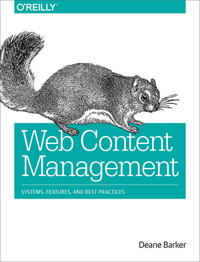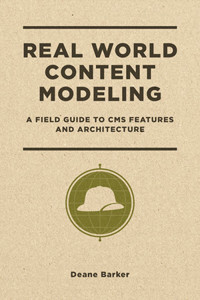Introduction to CMS: Course Syllabus
This is a course taught by Deane Barker for the Masters in Content Strategy program at FH Joanneum in Graz, Austria.
This course is designed as an introduction to the ideas, architecture, and technical basis behind the modern content management system (CMS). Emphasis is given to the lifecycle of content within a CMS, from modeling and aggregation, through editorial workflow, and finally to transformation and publication.
This course is targeted to non-developers. Some experience with CMS as a user is helpful, but not required.
The primary goal of the course is for you to understand the breadth of content management from a systems perspective. The secondary goal is for you to understand the scope of a content management implementation project and some of the variables and dynamics of an associated professional services relationship.
This course is comprised of:
- 8 full lectures, each approximately one hour long
- 1 capstone lecture, approximately 20 minutes long
- 3 assignments
- 2 books, totaling approximately 550 pages of reading
- Several dozen additional reading assignments
Grading
The course is graded as follows:
- You will receive the default grade of “2” if you attend all lectures, complete all reading, and complete both assignments
- If you desire an advanced grade of “1” you will need to contact the instructor for one extra-curricular assignment
- If you do not complete all coursework, you will receive an unsatisfactory grade.
I do evaluate both assignments, but I do not check attendance for the lectures, nor do I verify that you have completed the reading. I assume you are taking the course to learn the material, and therefore I trust you will complete the work.
Books
The two books for the course are:

Web Content Management: Systems, Features, and Best Practices (“Squirrel”)
- by Deane Barker
- O’Reilly Media, 2016
- 364 pages
- Purchase from Amazon
- Read on this site for free
Selected chapters of this book will be assigned after each lecture. You will read 13 of the 16 chapters of this book.

Real World Content Modeling: A Field Guide to CMS Features and Architecture (“RWCM”)
- by Deane Barker
- Amazon Direct Publishing, 2019
- 210 pages
- Purchase from Amazon
- Read on this site for free
You will read this entire book at your own speed, but it needs to be complete by Lecture 5.
Lectures / Lessons
There are eight lectures, delivered live or recorded. Each lecture is accompanied by additional reading (all reading is from Gadgetopia and written by the instructor, unless otherwise noted).
If possible, I would like you to complete the book reading prior to the lecture, and the additional reading after the lecture.
Lesson 1: The Content Technology Landscape
What are all the different segments in the content technology space, what do they do, and where do they fit on the lifecycle of the management of content?
Lesson 2: The Basics
The differences between content, content management, and a content management system. Types of content management systems. Why we use CMS, what a CMS does, and what CMS doesn’t do.
- Chapters 1 and 2 in Squirrel
- Start reading RWCM
- Read: Content Management is an Emergent Skill
- Read: Why You Need Two Types of Content Strategist, Content Marketing Institute, by Ann Rockley. I want you to reflect on Rockley’s concept of “front-end” and “back-end” content strategy and consider your own career plans in this context.
Lesson 3: Acquiring a CMS
The four acquisition models of CMS: open-source, commercial on-premise, commercial as a service, build your own.
- Chapter 3 in Squirrel
- Continue reading RWCM
- Read: Sample Analyst Report (PDF), Real Story Group. This is an example of an evaluation report that an analyst firm writes about a CMS. Companies pay subscription fees to have access to this type of research. You don’t need to learn about this particular CMS (Adobe, in this report), but I want you to read the report to understand some of the factors analysts review for their customers.
- Read: Why Categorizing, Comparing, Rating, and Evaluating a CMS is Really, Really Hard
- Read: Why Organizations Pick CMS X Over CMS Y
- Read: Problems, Patterns and Why Every CMS Thinks It Knows What You Need
Lesson 4: Content Modeling
The separation of content and presentation. Why we model content. The components of a content model: types, attributes, datatypes, and validation rules. The difference between discrete and relational content modeling.
- Chapter 6 in Squirrel
- Continue reading RWCM (you should be close to finishing this)
- Read: Content Management and the Separation of Presentation and Content, University of Wisconsin-Milwaukee, by Dave Clark
- Read: Chasing the Ideal: Relational Content Modeling in Content Management
- Read: To Structure or Not to Structure
Lesson 5: Content Aggregation
What a content aggregation is. The different “shapes” of content. Additional aggregation structures. Aggregation restrictions and validation.
- Chapter 7 in Squirrel
- Finish reading RWCM
- Read: The Art and Practice of Content Assembly: Where IA and CMS Meet
- Read: Menuing in Content Management: Implicit vs. Explicit
- Read: Rivers, Not Trees: The Challenge to Organizational IA. This is not about content management. It’s about information architecture, but it provides some good perspective on serial vs. hierarchical content
Lesson 6: Templating and Output Management
Content channels. Coupling models. Templating and common templating constructs and languages. Request-Object mapping. The operative content object vs. the surround. Contextual influence in the surround.
- Chapter 9 in Squirrel
- RWCM should be complete, by this point
- Read: Decoupled Content Management 101
- Read: The Problem of Context
Lesson 7: Editorial Workflow
Why editorial experience matters. The content lifecycle. Editorial findability. Editorial interface. Versioning and version control. Archiving. Approvals. Permissions. Localization. Personalization. Form Building.
- Chapters 8 and 10 in Squirrel
- Read: The Truth About CMS Form Builders
- Read: Content Personalization: A Reality Check
- Read: You Want Collaboration, Not Workflow
- Read: Perspectives On What ‘Archiving’ Means in Content Management
Lesson 8: CMS Implementations
Who implements the CMS. Development project methodologies. Pre-implementation artifacts. Wireframe analysis. Implementation decision factors. Content integration. Non-development tasks. QA and deployment planning. Professional services engagement models and relationships. Training.
- Chapters 12 and 14 in Squirrel
- Read: Rationality in CMS implementation planning, O’Reilly Media, by Deane Barker
- Read: Select an Integration Partner, Web Project Guide, by Deane Barker
- Read: The Sometimes Confusing Economics of the Professional Services Business
- Read: Everyone Wants a Number
- Watch: Why Content Projects Fail (51:13), Codegarden 2017
Capstone: CMS in Eight Eternal Principles
The eight most important principles to effective implementation and usage of a content management system.
(There is no additional reading for this lesson.)
License
This course was developed by Deane Barker. If you have an interest in re-distributing or re-using this content, please contact me. Note that some supplemental content of this course may be copyrighted by others.

This work is licensed under a Creative Commons Attribution-NonCommercial-ShareAlike 4.0 International License.